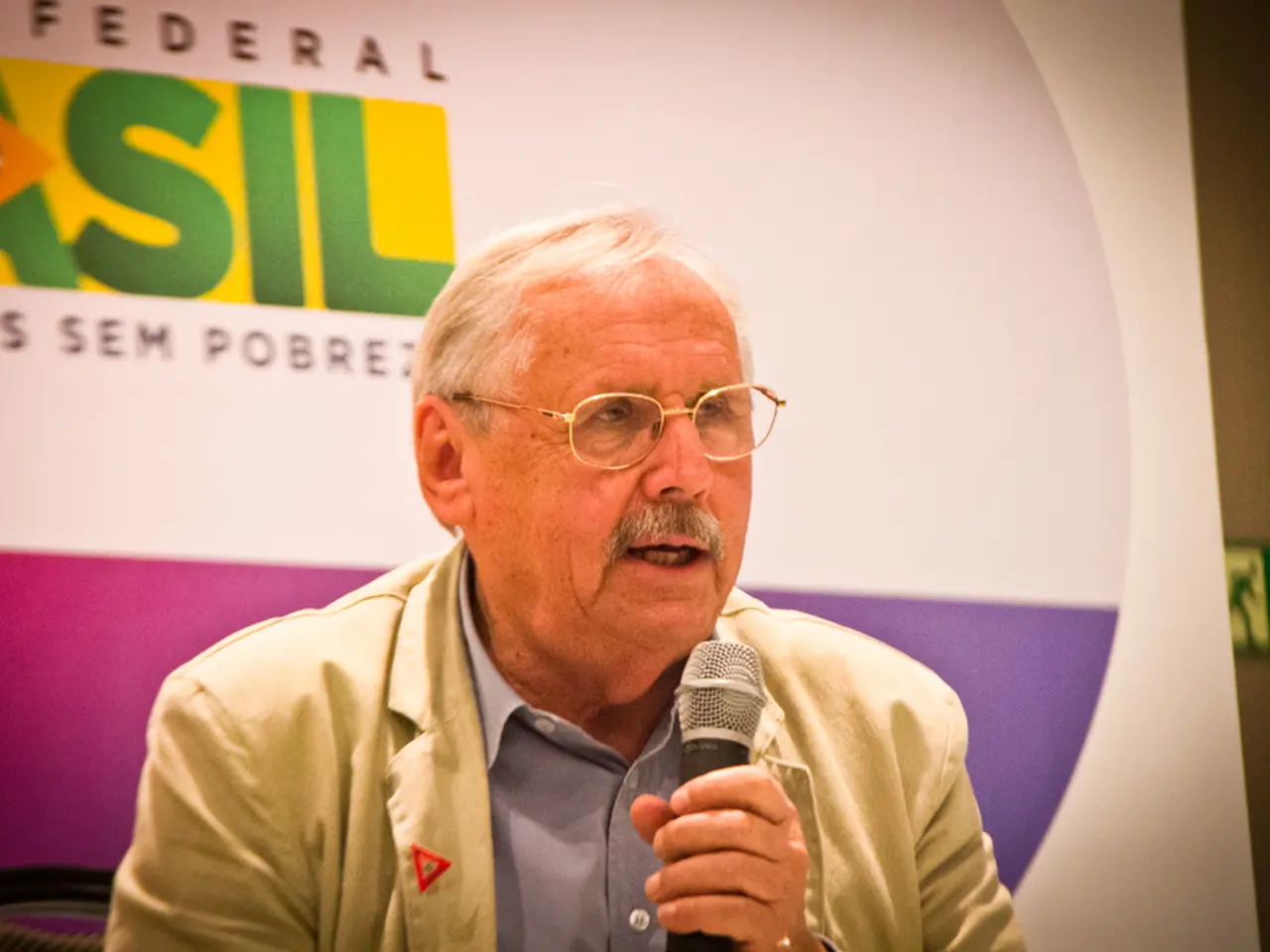Exploring the Emergence and Influence of Existentialism
Man, Meandering Through Life's Chaos: A History of Existentialism
Existentialism, a revolutionary philosophy, stormed the halls of academia and floorboards of literary circles, peculiar in its timing, as it arose amidst the tempestuous 19th and early 20th centuries. It was a response to the challenging, often disheartening environment Europe faced during this period, characterized by social upheaval, wars, and a world that seemed to be constantly evolving at breakneck speeds.
In essence, existentialism aimed to explore the complexities of human existence, focusing on individual freedom, responsibility, and the quest for meaning within a seemingly indifferent universe. This philosophical juggernaut has left an indelible mark on our collective consciousness.
The Shaping of Existentialism: When the Familiar Disappeared
Hammer of the Industrial Age: The Emergence of Modern Times
To understand the evolution of existentialism, one must delve into the profound changes brought about by the Industrial Revolution. Rapid urbanization, the rise of factories, and the shifting role of the individual in the workforce led to a profound sense of disconnection. People evolved from being defined by their personal relationships and communities to mere cogs in a soulless machine. This dehumanizing experience fueled existentialist concerns about the loss of individual meaning and the struggle for personal freedom [3][4].
Political Whirlwind and the Clash of Ideas
The 19th and early 20th centuries were turbulent, witnessing intense political and social turmoil. The French Revolution, the spread of nationalism, and the rise of Marxist ideas drastically altered the political landscape, challenging traditional structures of authority and prompting new questions about the roles of both the state and the individual. As society grappled with the implications of these changes, the seeds of existentialism began to sprout, offering a framework to examine the personal responsibilities each individual bore within a dynamic, unpredictable world [1].
War, Tears, and the Ache for Meaning
The devastating World Wars further deepened the existential crisis in Europe. The widespread suffering, destruction, and loss of life led many to question the foundations of humanity, the meaning of existence, and the role of the individual in a world that seemed cruel and indifferent. This period served as a catalyst for existentialism, as philosophers and writers began to explore themes of absurdity, isolation, and the search for meaning [2].
Foreshadows of the Movement: Early Influential Figures
Søren Kierkegaard: Father of a New Way of Thinking
19th-century Danish philosopher Søren Kierkegaard was often credited as one of the first to lay the foundations for existentialist thought. He examined the complexities of individualism, anxiety, and despair in the face of life's uncertainties, creating a foundation for the existentialist philosophers who would follow. Kierkegaard's ideas about "leaping into faith" and the "angst" of existence resonated deeply with later existentialists, who shared his focus on the importance of personal choice, authenticity, and individual truth [3].
Friedrich Nietzsche: The Birth of the Superman
German philosopher Friedrich Nietzsche further developed existentialist themes by challenging traditional moral values and proposing a vision of humanity that transcended societal norms. Nietzsche's famous declaration that "God is dead" marked a seismic shift in religious beliefs and the moral foundations that supported them. In Nietzsche's view, the death of God required individuals to create their values and meaning. His concept of the "will to power" suggested that humans were driven by an inherent desire to assert dominance and shape their future. Nietzsche's idea of the Superman encapsulated his vision of an individual who, by transcending societal norms, lived authentically and in control of their world [2][3].
The Existentialist Bloom: Literature and Philosophy
Literature: An Introduction to a Radical Idea
In the early 20th century, existentialism gained prominence in more than just philosophy. Literature, in particular, served as the gateway to these unconventional ideas, as writers like Jean-Paul Sartre, Simone de Beauvoir, and Albert Camus explored existential themes of alienation, absurdity, and personal responsibility through novels, plays, and essays. Their works illustrated the existentialist concern with the absurdity of life and the search for authenticity in an indifferent universe [4].
Sartre, de Beauvoir, and the Philosophy of Existentialism
While literature provided introductions to existentialist thought, the movement developed into a fully-fledged philosophical school of thought. Jean-Paul Sartre, perhaps the most famous existentialist philosopher, articulated a comprehensive theory of human freedom, responsibility, and self-determination. Sartre's notion of "bad faith" demonstrated how the evasion of responsibility and the denial of personal accountability hindered individuals from living authentically [1][2][4].
Simone de Beauvoir, meanwhile, made significant contributions to existentialism, focusing on feminism. Her groundbreaking work, "The Second Sex," delved into the human condition of women, plagued by limiting societal roles and expectations. De Beauvoir emphasized the importance of personal responsibility and self-creation in a world that often tried to restrict and define individuals [1][2][4].
Philosophy Evolves: From a Movement into a School of Thought
As existentialism gained recognition, it transformed from a literary movement into a philosophical school of thought, complete with systematized theories and academic discourse. Philosophers like Martin Heidegger and Maurice Merleau-Ponty further expanded existentialist thought, weaving it with phenomenology and other philosophical schools to better address the complexities of human experience [4].
Witnessing the Residue of War: Post-War Existentialism
The Post-War Legacy: A Crisis Needing a Response
In the aftermath of World War II, existentialism became a vital philosophy for understanding the human condition in a broken world. The sheer devastation, destruction, and loss of life left many wondering about the inherent meaning of life and the purpose of human existence. Existentialism provided a lens for making sense of this broken world, while questioning the authority of traditional institutions such as politics and religion that failed to prevent the horrors of the recent past [5].
The Spirit of Existentialism: A Response to Pain and Despair
For many, existentialism became a means of grappling with the trauma of their experiences, as philosophers and writers began to explore the challenges of life in a world that refused to offer solace or meaning [5]. Albert Camus, in his influential work, "The Myth of Sisyphus," addressed the concept of the "absurd," the realization that the inherent meaninglessness of life could not be escaped. However, he encouraged individuals to acknowledge their freedom and continue to shape the world, even if it seemed futile [5].
Embracing the Broken World: The Sustained Influence of Existentialism
After World War II, existentialism became a lasting intellectual force in Europe and beyond, responding to the disillusionment with traditional institutions and the post-war need for new ideas. Existentialism challenged individuals to confront the emptiness of their once unquestioned beliefs, inspiring a new wave of critical thinking, artistic expression, and cultural change. Its emphasis on personal responsibility, authenticity, and self-determination remains a powerful movement that continues to influence debates about the human condition, freedom, and the search for meaning [5].
In Conclusion
The rise of existentialism to prominence in the 19th and 20th centuries followed suit with drastic social changes that left individuals in search of answers, interpretations, and meaning amidst a rapidly evolving world. Philosopher William James once wrote, "The greatest discovery of any generation is that a human can alter his life by consciously changing his mindset." Existentialism, in its essence, teaches us that the meaning of life lies in the choices and responses each individual makes, no matter how dark or uncertain the world around them may seem.
- The profound changes brought about by the Industrial Revolution led to a sense of disconnection and fueled existentialist concerns about the loss of individual meaning and the struggle for personal freedom.
- The French Revolution, the spread of nationalism, and the rise of Marxist ideas in the 19th and early 20th centuries greatly altered the political landscape, prompting new questions about the roles of both the state and the individual and served as the seeds of existentialism.
- The devastating World Wars, widespread suffering, destruction, and loss of life further deepened the existential crisis in Europe, leading many to question the foundations of humanity, the meaning of existence, and the role of the individual in a world that seemed cruel and indifferent.
- Søren Kierkegaard, a 19th-century Danish philosopher, was often credited as one of the first to lay the foundations for existentialist thought, focusing on the complexities of individualism, anxiety, and despair in the face of life's uncertainties.
- In his influential work, "The Myth of Sisyphus," Albert Camus addressed the concept of the "absurd" and encouraged individuals to acknowledge their freedom and continue to shape the world, even in a seemingly meaningless existence.
- The post-war era saw existentialism as a vital philosophy for understanding the human condition in a broken world and provided a lens for making sense of the horrors of the recent past, questioning the authority of traditional institutions such as politics and religion.
- Existentialism continues to influence debates about the human condition, freedom, and the search for meaning, inspiring a new wave of critical thinking, artistic expression, and cultural change, demonstrating that the meaning of life lies in the choices and responses each individual makes amidst a rapidly evolving world.




